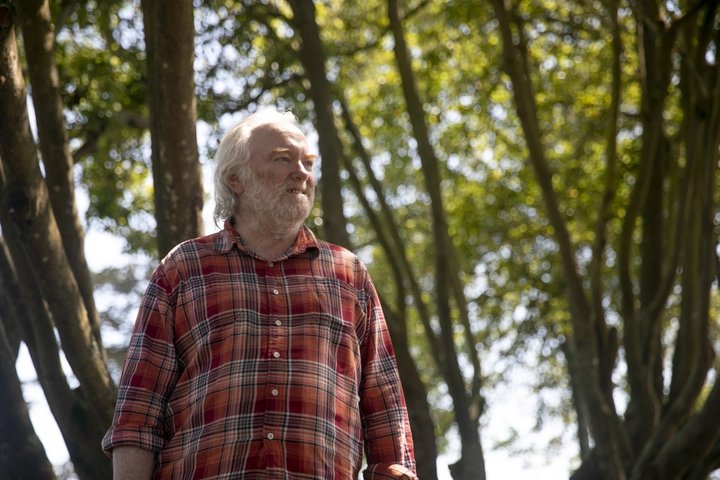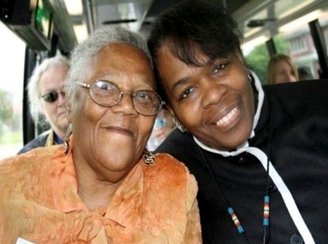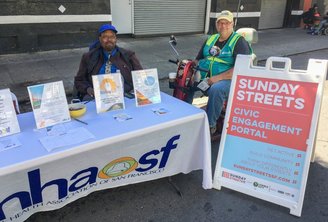
Peter Murphy, an outreach manager for the Mental Health Association of San Francisco, struggled to find people who could support him with his mental health issues before joining the organization. He says peer support gives people a chance to be heard and understood. Photo by Anne Wernikoff for CalMatters
###
Keris Jän Myrick keeps a photo on her desk of the woman who helped transform her life.
As a Black woman living with schizophrenia, Myrick had spent years searching for a mentor. Someone who wouldn’t judge, wouldn’t pathologize, wouldn’t ask her to translate her reality into terms they could understand.
“I was looking for someone like me,” she said.
But when Myrick attended mental health recovery conferences, the people on stage were mostly white. Sometimes she wondered: Is this movement for me?
Eventually, she befriended Jackie McKinney, a Black woman who had been hospitalized with mental illness for years, and had gone on to earn a master’s degree in social work. That relationship proved pivotal.

Keris Jän Myrick, right, of the Los Angeles County Department of Mental Health, with her mentor, Jackie McKinney. Photo courtesy of Keris Jän Myrick
Today, Myrick works for the Los Angeles County Department of Mental Health and is a member of a large coalition of mental health advocates pushing Gov. Gavin Newsom to sign a bill creating a peer certification pathway in California. As the county’s chief of peer and allied health professions, Myrick recently wrote a commentary for CalMatters, asking for the governor’s backing.
Peers are individuals who have lived with mental illness and are uniquely positioned to support others in the midst of a crisis. They can listen with an empathy borne of shared experience. They often have firsthand experience with services and treatments, which can make the knowledge they share feel trustworthy. And they often have cultural fluency that allows them to connect with marginalized communities underrepresented in the ranks of other mental health providers.
Myrick describes the role of peers like this: “We have been through crises. We have been through hell and back. And we use those experiences to help others.”
Peer providers in California can already be found working in community clinics, running support groups, answering calls and doing outreach in the streets, schools and hospitals. But the federal government requires that states have a special peer certification to collect federal Medicaid dollars for these services. Currently, 48 states have such a certification. Only two — South Dakota and California — do not.
Advocates say that, because there is no formal certification process for peers in California, organizations that serve people with mental illness here often have no way of billing Medi-Cal for many of the services peers provide. They also worry about a lack of uniform training, with significant variation among counties on what it takes to be a peer provider.
Advocates have spent the past eight years attempting to convince the state to change that. State Sen. Jim Beall, a San Jose Democrat and longtime mental health champion, is the author of the current bill. He attempted to pass similar peer support certification bills in 2018 and 2019.
Former Gov. Jerry Brown vetoed the first one, saying it would impose a costly new Medi-Cal benefit, requiring the state to shell out potentially tens of millions annually from its general fund to pay the non-federal share of cost for Medi-Cal. He also expressed concern that the bill could shut out some peer providers.
Newsom vetoed Beall’s second bill, also noting the high cost to the state. In his veto message, he said he might consider peer support services as part of a future comprehensive mental health package.
“When we say it saves lives, it’s not hyperbole… It really is a linchpin in moving people into recovery and stabilizing them long-term”
— Michelle Cabrera, County Behavioral Health Directors Association
As the pandemic and economic recession drag on, county mental health systems are bracing for growing demand for services — a recent study by the CDC found that 40 percent of American adults have struggled with mental illness or substance abuse during the pandemic. A new report in the Journal of the American Medical Association shows a near tripling of rates of depression since the pandemic began.
Now closing out his final few months in the Legislature, Beall wants to cement peer certification as part of his legacy–and views Newsom’s decision as a litmus test of the governor’s commitment to reforming the mental health system: “It’s almost unconscionable to not have boots on the ground helping people that lived like experiences,” said Beall, whose third attempt has slashed the state’s cost. “It’s not understandable why they don’t want to spend a little bit of money to get this thing going.”
Compared to previous iterations, this year’s bill has several changes that supporters believe will help facilitate its passage, said Michelle Cabrera, executive director of the County Behavioral Health Directors Association, one of the bill’s co-sponsors.
Most significantly, the current bill would make the certification process an opt-in model for counties. The state would need to pay an estimated $1 million to $2 million to create the statewide certification standard, she said, but otherwise the bill shifts financial responsibility for implementation and oversight to the counties. Cabrera said many counties are ready to take on those costs because of the program’s clear benefits and because, in some cases, they are already paying for peer services.
“I think people maybe sometimes don’t understand just how uniquely effective it is,” she said of peer support services. “When we say it saves lives, it’s not hyperbole…It really is a linchpin in moving people into recovery and stabilizing them long-term.”
Peter Murphy, the outreach manager for the peer-led Mental Health Association of San Francisco, recalls drinking, using and struggling with mental health issues years ago. He’d often think to himself: “I’m screwed. I’m so different and messed up.” He found sponsors through 12-step programs to support him in getting clean and sober — but he didn’t know who to turn to for mental health concerns. At times, he was anxious, suicidal and feared people were after him.
Eventually he found his way to the Mental Health Association of San Francisco, where he has worked for the past several years. In recent months, due to the pandemic, phone lines sometimes have been overrun.

CW Johnson, left, does mental health outreach in the Tenderloin neighborhood of San Francisco in 2019. Photo courtesy of Peter Murphy
“I would say that a lot of it, at the most basic level, we offer a human connection of support,” he said.
His colleague, CW Johnson, offers the story of his life as a vehicle for insight and hope. Johnson tells students and medical providers about his experience growing up with neurological damage, the delusions and racing thoughts, the name-calling and stigma.
But the most meaningful work, for him, involves sharing his story with residents of the psychiatric inpatient unit where he once stayed. When people undergo surgery for a broken leg, Murphy points out, loved ones send cards and flowers. But when people end up in the psych unit, their loved ones often don’t know how to respond — and so don’t respond at all. That can be deeply isolating.
Johnson sees the way these residents look at him when he visits. Their eyes tell him: “Oh God, you’ve been here before, too.”
“What drives me is that I don’t want anyone to feel like they have no voice,” he said. “A lot of the time I felt like I had no voice. I felt ashamed of having mental health issues. And I want people to know they don’t have to feel that way. There are people that have walked in their shoes.”
###
CALmatters.org is a nonprofit, nonpartisan media venture explaining California policies and politics.
CLICK TO MANAGE